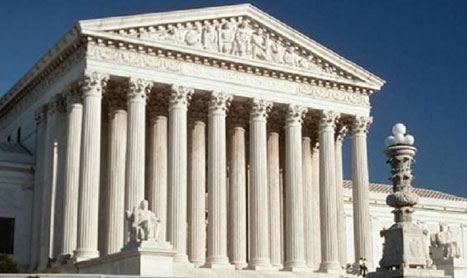Capital News Service reporter Sarah Hogue, 20, had a ringside seat for the historic debate on President Obama’s health care reform package on Wednesday. Here is her account of what it means to her as a University of Maryland junior journalism major.
WASHINGTON – Outside the Supreme Court this morning there were close to 100 protesters and others waiting to get in. The protesters were from different factions — for “Obamacare,” against it, or for something else entirely, looking for attention, to make a point, or to be a part of history.
On this final day of proceedings, you could say the protests have peaked. News crews were almost as common as demonstrators, recording the famous opponents of the Patient Protection and Affordable Care Act, like Michelle Bachmann, and the proliferating posters and chants.
I listened to a speaker who said he was from the Navajo Nation, saw protesters with duct tape over their mouths with the word “life” written on the strip, and heard chants of “We love Obamacare!”
All of this was taking place because Americans seem to feel very strongly about who controls their insurance and how it’s managed.
In the middle of it all, I felt like the provision that I care about the most — the clause that allows my parents health insurance to cover me until I turn 26 — would hurt me if was repealed. That clause in particular, I feel, reflects the economic times we live in. It’s so difficult for college-age people (especially journalists) to get jobs out of college. Currently in the U.S., no job basically means no insurance. No coverage for the unexpected.
But that piece of the law was not the debate of the day. The court was there to determine, before other, major components of the act are phased in, whether those provisions are constitutional.
Being here for the last day of three days of arguments doesn’t make me feel any more in control of the decision being made. But I do feel more informed. The issue is not a question of the morality of PPACA, but the constitutionality.
The key component of today’s case discussion, individual mandate — or whether the government can require individuals to purchase health insurance and penalize them if they don’t — could be deemed unconstitutional. A negative decision on that could mean the entire law would be shot down.
On Day One of the hearings, the Supreme Court challenged whether Congress can impose a “tax” in this manner for not getting insurance by 2014.
On Day Two, individual mandate itself was questioned. It was argued that it was against Congress’s authority to require people to purchase something they may not want. Unfortunately, we need to wait until June to know if they find that part to be constitutional.
Today was Day Three, and arguments centered on what would happen if the individual mandate component was taken out of PPACA, would there be anything left?
Paul Clement, a former solicitor general, said that the PPACA could not stand without the individual mandate, and therefore should be struck down. The court seemed not to agree with this and suggested that what was left could be salvaged, but Clement was firm in his point that the PPACA would be a “hollowed-out shell” without the individual mandate.
Something I never expected to hear in court on such a weighty matter was laughter, yet there were plenty of light moments.
For example, the next speaker was Deputy Solicitor General Edwin Kneedler, who proposed that the entire mandate be gone through item by item to determine the constitutionality of all provisions included. Looking over a 2,700 page report line by line would take Justice Anthony Kennedy’s law clerks a long time, Justice Antonin Scalia said to the laughter of the courtroom.
The last speaker was H. Bartow Farr III who offered a compromise to disregarding the mandate entirely: Keep the other two important components called “guaranteed issue” and “community rating.” These are closely related to individual mandate but include much less government regulation. Justice Scalia said that even without the constitutionally questionable piece, the mandate would be empty.
Listening to the debate was like a tennis match, where the only clear outcome was that the court would be very divided.
The experience showed me how specific the Supreme Court is in the evidence needed to help them make a decision. It showed me that the future of health care is being decided deliberately and carefully. Getting to see that was encouraging and scary, considering that once everything is said and done, I might need to search for healthcare after college, rather than expect it.

